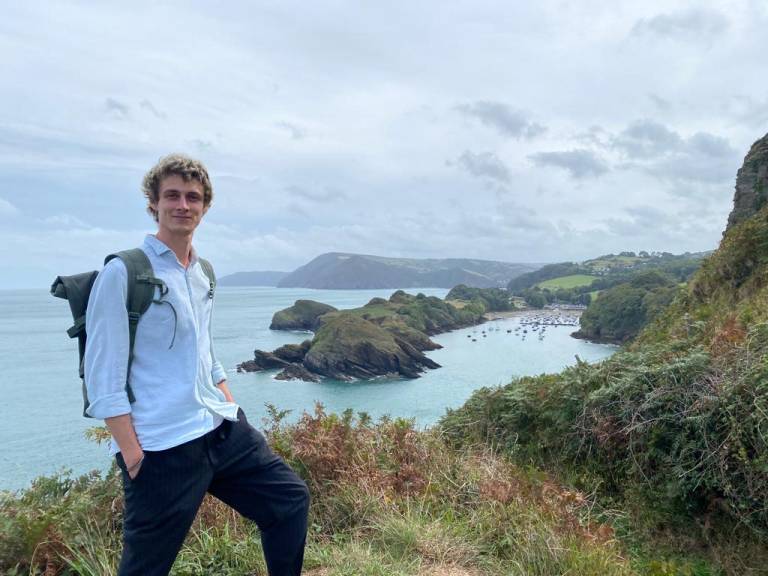Robin Lockyer-von Dorrien - Legal and Political Theory student.

Why did you apply to Political Science Department, UCL?
I applied to the Political Science Department of UCL because I wanted to do the MA of Legal and Political Theory.
Tell us about your student recruitment journey, was there something particular that made you apply and accept your offer?
I applied to the Legal and Political Theory programme because it offers a really nice mixture of jurisprudence and political theory with a wide array of different modules and incredibly knowledgeable lecturers. For me personally, it was the modules that related to questions of international/global justice that really attracted my interest. So naturally, I accepted after I was offered a place in the programme.
What were your first impressions of the department?
Visiting the UCL main quad in the heart of London for the first time was more than impressive. So many buildings and students! But quickly it all became quite familiar and known to me. The department especially feels very homey and welcoming. Furthermore, it is really well equipped. It has a cosy common room, an area with computers and great seminar rooms.
What is the rest of your cohort like?
As I am a part-time student, I have actually had the pleasure of meeting two cohorts. Both of which have been super nice and sociable. There is definitely a lot going on in and outside of the classrooms.
What is the teaching and learning like?
As the MA of Legal and Political Theory is quite heavy on reading, the teaching focusses on discussing the notions, theories and concepts of the weekly reading, which is great! Modules consist of a lecture and a seminar. While lectures introduce and elaborate on a topic and relevant thinkers in the area, the seminars are all about discussing. The lectures are really informative and help illustrate the reading nicely and because the seminars are usually quite small (no more than 15) everybody who wants to can get involved in the seminar discussions.
Hearing all these different opinions on the weekly topic or reading really contributes to an enormous learning curve. Also, through the written assessments of the topic, you get the chance to deep-dive into one of the topics and become sort of an expert in it.
What do you like best about your course so far?
For me, it’s probably the seminar discussions! I really like that most of the seminars are structured in a very open way and everybody can give their opinion and arguments in favour or against the weekly reading. The general atmosphere in these seminars is super open and thus you can really learn a lot there. Apart from that, the people in the department are super nice and helpful. This includes administrative and academic staff and the cohort.
What advice would you give to overseas students wanting to study in the UK?
It is definitively worth coming over to the UK to study here. Even though visas and figuring out how best to move country can be quite daunting, UCL is there to help you. My advice would be to contact the International Student Support team for guidance and general advice because they’re really helpful and know what they’re talking about.
Would you recommend your programme to prospective students and why?
If you like analytical political theory or are interested in this field, I can recommend it fully! The department’s staff are really knowledgeable and there are modules for everyone. Furthermore, the possibility of attending modules in collaboration with other MAs is a great way of getting to know people across different disciplines.
What are your career aspirations and how do you envisage your master’s helping with these?
I am not completely sure yet where the future will take me. However, the MA of Legal and Political Theory helps build a wide array of crucial skills for a lot of industries, such as logical and critical thinking, constructing arguments, and good writing skills. At the moment, I am looking into doing a PhD and going on to an academic career or going and working for the state in e.g. the diplomatic service.
 Close
Close

